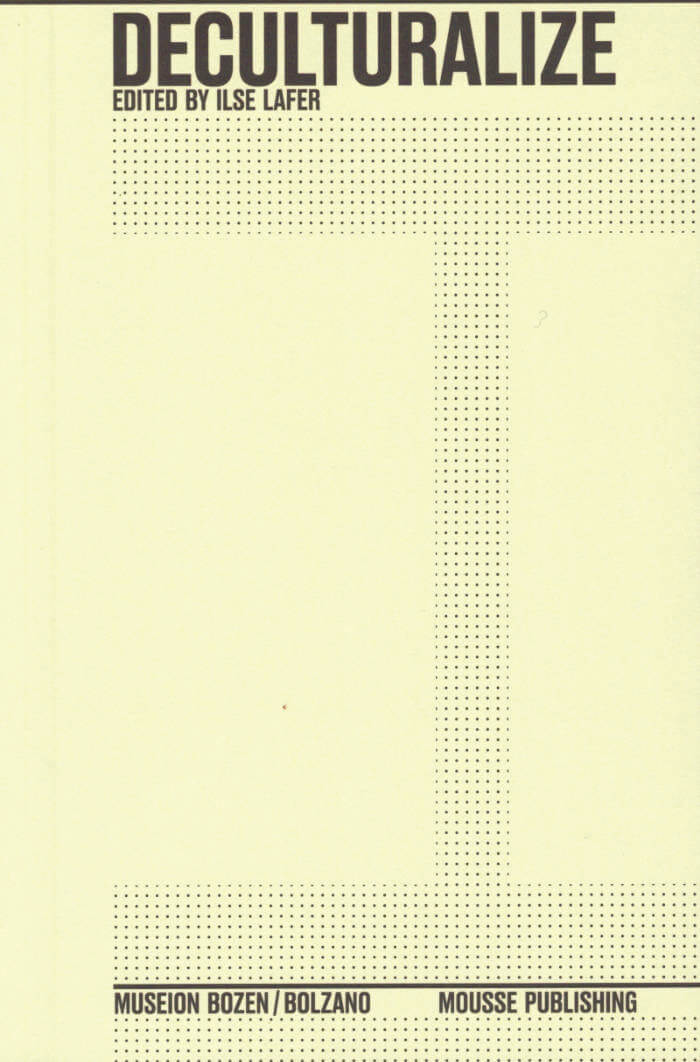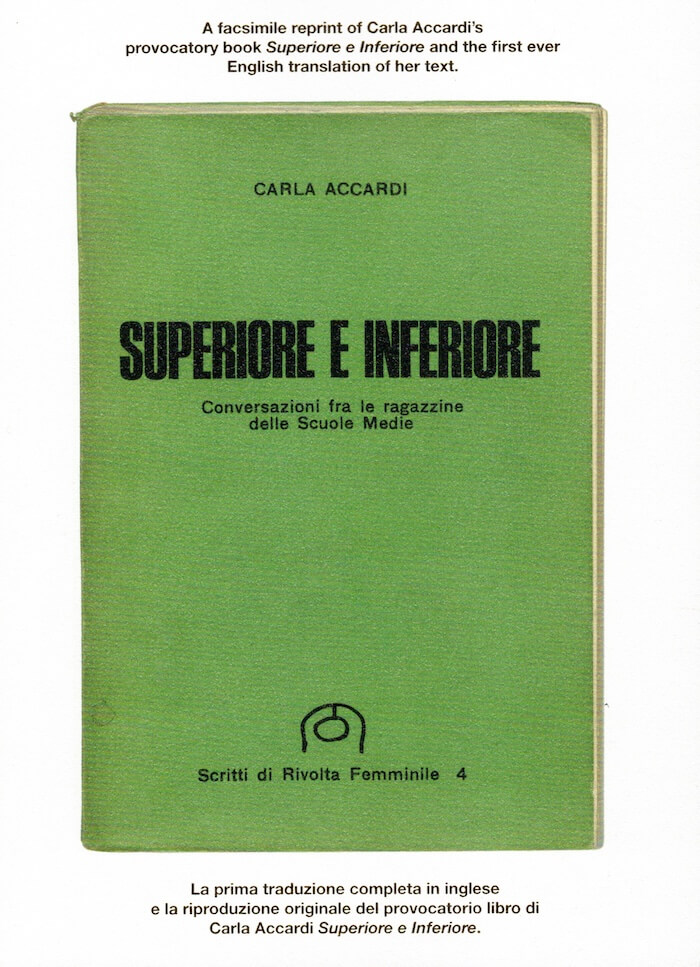Carla Lonzi
Carla Lonzi

Autoportrait
This publication of “Autoportrait,” translated into French for the first time, is accompanied by a foreword, and a critical and biographical structure by art historian Giovanni Zapperi, showing the singularity of Carla Lonzi's project. Made up of a series of recorded interviews, subsequently transcribed and recomposed to give birth to a particular textual montage, “Autoportrait” is an experimental attempt to reinvent art criticism thanks to a fragmentary discourse and an iconography in which reproductions of works mix with intimate images. An invaluable document on Italian art in the 1960s, “Autoportrait” is a polyphonic book, “a kind of maieutic banquet” to which Carla Lonzi invites us in order to rethink the production of discourse on art and artists.
Interviews with Carla Accardi, Getulio Alviani, Enrico Castellani, Pietro Consagra, Luciano Fabro, Lucio Fontana, Jannis Kounellis, Mario Nigro, Guilio Paolini, Pino Pascali, Mimmo Rotella, Salvatore Scarpita, Guilio Turcato, Cy Twombly...
Under the direction of Patricia Falguières, the “Lectures Maison Rouge” series has as its ambition to propose artist's texts which interrogate at the same time museology, exhibition making, and the work of certain artists themselves.
The life and work of Carla Lonzi (1931–1982) is inseparable from the cultural, political, and social history of Italy in the decades following the Second World War; she occupies a singular position, which today merits reevaluation. A reputed art critic of the 1960s artistic scene, both friend and collaborator of such figures as Carla Accardi, Luciano Fabro, Giulio Paolini, and Jannis Kounellis, she wrote “Autoportrait” in 1969, a “love letter” to the artists and to creation, but also a farewell chorus to art criticism and the art world. The following year she founded Rivolta Femminile, an active feminist collective, thus becoming the central figure of Italian feminism.

Self-portrait
Allison Grimaldi Donahue, Carla Lonzi
Recorded and transcribed throughout the 1960s, Carla Lonzi’s Self-portrait ruptures the narration of post-war modern art in Italy and beyond. Artmaking struck Lonzi as an invitation to be together in a ‘humanly satisfying way’, and this experiment in art-historical writing is a testament to her belief. Lonzi abolishes the role of the critic, her own, seeking change over self-preservation by theorising against the act of theorising.
The life and work of Carla Lonzi (1931–1982) is inseparable from the cultural, political, and social history of Italy in the decades following the Second World War; she occupies a singular position, which today merits reevaluation. A reputed art critic of the 1960s artistic scene, both friend and collaborator of such figures as Carla Accardi, Luciano Fabro, Giulio Paolini, and Jannis Kounellis, she wrote “Autoportrait” in 1969, a “love letter” to the artists and to creation, but also a farewell chorus to art criticism and the art world. The following year she founded Rivolta Femminile, an active feminist collective, thus becoming the central figure of Italian feminism.
Interviews with Carla Accardi, Getulio Alviani, Enrico Castellani, Pietro Consagra, Luciano Fabro, Lucio Fontana, Jannis Kounellis, Mario Nigro, Guilio Paolini, Pino Pascali, Mimmo Rotella, Salvatore Scarpita, Guilio Turcato, Cy Twombly.
Afterword by Claire Fontaine.
Translated by Allison Grimaldi Donahue.
978-1916425088
105 b&w illustrations
21.6 x 13.9 cm
364 p.
Paperback
November 2021

Deculturalize
The radical feminist practice of the Italian art historian, art critic, poet, and feminist Carla Lonzi (1931–1982) and its potential relationship to both historical and contemporary art practices offers the contextual framework for the publication Deculturalize.
Lonzi's recurring demand for deculturizzazione, echoed in the book's title, is based on her proclamation that women's inclusion in society must be understood as a constant colonization. Their ensuing "impotence, lack of history, lack of culture" and "insignificance" can thus only be abolished through the establishment of an "unexpected" (female) subjectivation. Rather than continuing to be the object of historical-social power dynamics, women must become the subject of their own life practices through their continuous withdrawal from (patriarchal) norms.
The book's authors explore if and to what degree Lonzi's radical feminist approach is based on art terms and concepts, or historical or contemporary art practices. The motivation was the exhibition Doing Deculturalization, presented at Museion, Bolzano, in 2019, and the related desire to address the (historically ambivalent) relationship between (Italian) female art and the formation of feminist theory.
Essays by Sabeth Buchmann, Laura Iamurri, Marco Scotini and Elvira Vannini, and Giovanna Zapperi focus on this by analyzing works by women artists whose practices are related to Lonzi's deculturizzazione concept. The contributions by artists Claire Fontaine, Ariane Müller, Margherita Morgantin (in conversation with Lia Cigarini) and Suzanne Santoro (in conversation with Ilse Lafer) present specific reflections on Lonzi's feminist legacy, which is always related to the individual artist's own artistic-feminist practice. Juxtaposed with these are philosophical and analytical concepts developed by Marc Rölli and Annarosa Buttarelli, who reconstruct Lonzi's theory of deculturizzazione based on its historical reference points and update it for the present.
With texts by Sabeth Buchmann, Annarosa Buttarelli, Claire Fontaine, Laura Iamurri, Ilse Lafer, Margherita Morgantin & Lia Cigarini, Ariane Müller, Letizia Ragaglia, Marc Rölli, Suzanne Santoro & Ilse Lafer, Marco Scotini & Elvira Vannini, Giovanna Zapperi.
Trilingual edition (English / German / Italian)
And more

The History Of Breathing
In the tradition of poets such as Charles Olsen, Alice Notley and Sappho, Allison Grimaldi Donahues poetry connects the history of breath and language with narratives about the discovery and loss of our own voice.
The Etruscan language knew no blank spaces, no breaks between words—its texture resembled an uninterrupted flow of speech; more singing than speaking, form rather than content. Only in the dictum of the pause, the meaningful fragmentation of the breath and the staccato of the Atemwende (Paul Celan) does language become comprehensible rhythmic expression.
In a world full of slogans and catchphrases, Allison Grimaldi Donahue defends the poetological demand of Sound over Content! The History of Breathing weaves linguistics and poetry, verse and song, meaning and sound into a dense narrative about breathing, rhythm, and the gaps in language that allow words to take on meaning in the first place.
Allison Grimaldi Donahue (born 1984 in Middletown, Connecticut, USA, lives and works in Bologna, Italy) works in text and performance exploring modes in which language and text can move between individual and collective experience. She is author of Body to Mineral and On Endings, and translator of Blown Away by vito m. bonito and Self-portrait by Carla Lonzi. She has given performances at Short Theatre, Almanac Turin, MACRO, MAMbo, Fondazione Giuliani, Kunsthalle Bern, Hangar Biccoca, and Flip Napoli.

Superior and Inferior
Superior and Inferior presents a facsimile reprint of Italian abstract artist and feminist Carla Accardi's provocatory publication Superiore e Inferiore and the first ever English translation of the full text.
"In this book, I have bought together the transcripts of dialogues I recorded on tape in three girls' classes from the first, second and third year of a state middle school. For having proposed this unauthorised activity, I was dismissed from teaching in the light of a formal complaint". – Carla Accardi introducing her book Superiore e Inferiore, 1972.
First published in 1972 by Carla Accardi, the book Superiore e Inferiore features discussions among girls at a middle school—all between 10 and 13—about society's discriminatory behaviour towards women. They also commented the Manifesto of the revolutionary feminist group Rivolta Femminile—collectively written by Accardi, art critic and feminist activist Carla Lonzi, and Elvira Banotti—which first appeared posted on city walls in Rome in July 1970. For having discussed sex-related issues with pupils, Accardi was fired and permanently suspended from teaching. (Her letter of dismissal issued by the Italian Ministry of Education forms part of the introduction to the book.) Along the lines of Pasolini's Comizi d'Amore (Love Meetings), Accardi's own voice is secondary in the book, giving way to the thoughts, narratives, opinions, and debates expressed among girls on the role of women and girls, family conflicts and intimate relations.
Carla Accardi (1924–2014) was an Italian abstract painter associated with the Arte Informale and Arte Povera movements, and a founding member of the Italian art groups Forma (1947) and Continuità (1961). She experimented with different forms of art, such as black and white painting and Sicofoil. During the late 1970s, she became part of the feminist movement with critic Carla Lonzi. Together, they founded Rivolta femminile in 1970, one of Italy's first feminist groups. Accardi's first solo exhibition in the United States was in 2001 at MoMA PS1.

Folio G: Gendered Labour and Clitoridean Revolt
Jaleh Mansoor, Sara Colantuono and 1 more
Folio G presents new translations of significant texts by two poles of Italian feminist thought—Leopoldina Fortunati and Carla Lonzi—to examine the “unexpected subject” of women in society and history. These texts are accompanied by contextual essays that explore the reverberation of their thought in contemporary artistic practice, theory, and models of creating freedom for women in everyday life.
New translations of texts by:
Leopoldina Fortunati
Carla Lonzi
Rivolta Femminile
Additional contributions by:
Sara Colantuono
Claire Fontaine
Maya Gonzalez
Matilde Guidelli-Guidi
Jaleh Mansoor
Giovanna Zapperi